

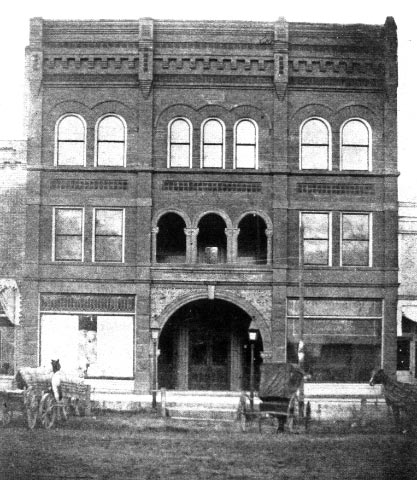
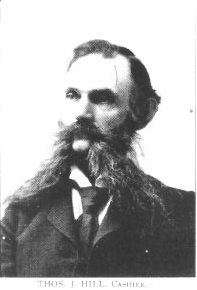
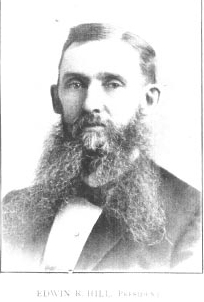 In April of 1896 ground was broken to begin construction of the opera house located on State Street in Colon. It was built by the Hill family, Elisha and sons Thomas Jefferson and Edwin Ruthven. The souvenir program for opening night describes the E. Hill and Sons company as "a firm engaged in general merchandising in Colon, as early as 1851." The E. Hill and sons bank which was on the ground floor of the building remained in the control of the family from its establishment in 1870 until after 1945. It was a pressed brick building trimmed with Marquette red sandstone. An inserted balcony in the second story broke the facade which featured heavy columns, headed with ornate carvings. Large plate glass windows enhanced the entrance to the opera house . Upon entering the building an oak staircase lead to the grand entrance with the box office at the left and on the right a reception, cloak and toilet rooms.
In April of 1896 ground was broken to begin construction of the opera house located on State Street in Colon. It was built by the Hill family, Elisha and sons Thomas Jefferson and Edwin Ruthven. The souvenir program for opening night describes the E. Hill and Sons company as "a firm engaged in general merchandising in Colon, as early as 1851." The E. Hill and sons bank which was on the ground floor of the building remained in the control of the family from its establishment in 1870 until after 1945. It was a pressed brick building trimmed with Marquette red sandstone. An inserted balcony in the second story broke the facade which featured heavy columns, headed with ornate carvings. Large plate glass windows enhanced the entrance to the opera house . Upon entering the building an oak staircase lead to the grand entrance with the box office at the left and on the right a reception, cloak and toilet rooms. 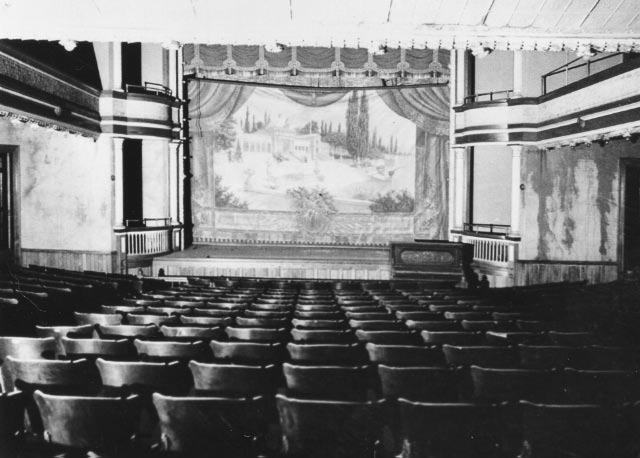 Double stairs in both directions lead the way to the large comfortable balcony. The general beauty of the auditorium was quite impressive. Gold and white colors decorated the front of the balcony and the four private boxes. Harmonious tapestries draped those areas to match the beautifully frescoed walls and ceiling. Six hundred mahogany opera chairs upholstered in a pale green added the final touch to this exquisite theater. Under the stage area were comfortable dressing rooms with wardrobes and lavatories. The third floor held additional wardrobes, dressing rooms, toilets and lavatories. Nothing was overlooked for the comfort and convenience of the patrons or the artists. The ground floor of the building was divided with the western portion arranged for an elegant storeroom and the eastern area reserved for the Exchange Bank. The rear portion of this level was for private apartments "with all the modern sanitary appliances."
Double stairs in both directions lead the way to the large comfortable balcony. The general beauty of the auditorium was quite impressive. Gold and white colors decorated the front of the balcony and the four private boxes. Harmonious tapestries draped those areas to match the beautifully frescoed walls and ceiling. Six hundred mahogany opera chairs upholstered in a pale green added the final touch to this exquisite theater. Under the stage area were comfortable dressing rooms with wardrobes and lavatories. The third floor held additional wardrobes, dressing rooms, toilets and lavatories. Nothing was overlooked for the comfort and convenience of the patrons or the artists. The ground floor of the building was divided with the western portion arranged for an elegant storeroom and the eastern area reserved for the Exchange Bank. The rear portion of this level was for private apartments "with all the modern sanitary appliances."
Well, that is the nice sounding side. Some two hundred gas jets illuminated the theater and were fed by a private gas plant in the basement of the building. Ross Lewis, chief usher at the Opera House recalled the gas lights with amusement: "One night while a show was in progress, the caretaker made his usual inspection of the [gas] plant and he brought the kerosene a little too close, and there was an explosion that could be heard for miles around as the [gas] plant blew up. Of course, the lights went out [at the opera house] and the play continued with candlelight. The bare jets were the latest thing when the opera house opened but they were annoying. The house smelled of carbide gas part of the time. The jets were lighted individually - 200 of them - with tapers. After they had burned for a time the tips would carbon up and shoot off streams of black smoke which settled on the audience as soot."
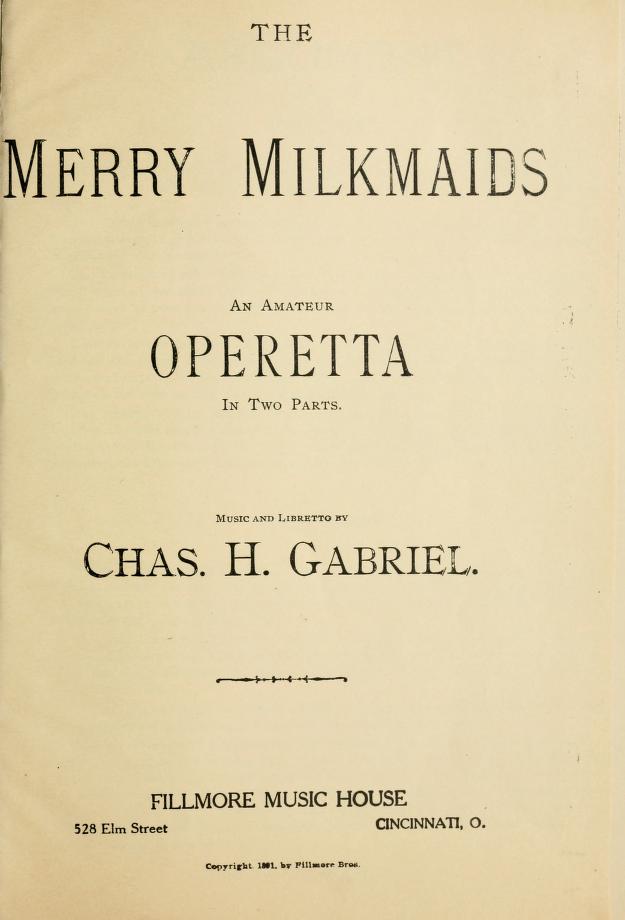 Hill's Opera House opened with a flourish on November 1, 1897 with an operetta called "The Merry Milkmaids", written by well known gospel composer Charles Hutchinson Gabriel, born August 18, 1856, in Wilton, Iowa. The seating capacity was 500 with additional space for100 chairs in the lecture room, or ballroom. Sharon Beth Wyrembelski wrote a master's thesis on the Hill Opera House. Her paper contains a few quotes from newspapers of the time: "On the night of the opening play, Mrs. Hill, then in her eighty-eighth year, was able to attend. As she leaned upon the arm of her son, Thomas Jefferson, who assisted her to enter their box, she was greeted with cheers by the audience, many of whom had known and honored her for over a half century, and by whom she is still spoken of as being the life of every social gathering which she attended." The review of the February 1898 play "On The Swanee" described those present and even their apparel. "It was a social event of top significance for it described the clothing worn by the 5 year olds as well as that of their parents". From Sharon's thesis: "Mr. Robert Tenney, during a personal interview on May 5, 1986, recalls that the Opera House was always well attended in his day and that his mother (Amelia Hill) remarked to him often about the wonderful productions and gratifying audiences." Robert Tenny was the grandson of Susan (Susie) and Edwin Hill. They lived in the large house that was located where the Sturgis Bank and Trust now stands. Pictures of the house are displayed in the lobby. A 1903 production included a live horse onstage. Now, how did they get the horse to go up/down the stairs?
Hill's Opera House opened with a flourish on November 1, 1897 with an operetta called "The Merry Milkmaids", written by well known gospel composer Charles Hutchinson Gabriel, born August 18, 1856, in Wilton, Iowa. The seating capacity was 500 with additional space for100 chairs in the lecture room, or ballroom. Sharon Beth Wyrembelski wrote a master's thesis on the Hill Opera House. Her paper contains a few quotes from newspapers of the time: "On the night of the opening play, Mrs. Hill, then in her eighty-eighth year, was able to attend. As she leaned upon the arm of her son, Thomas Jefferson, who assisted her to enter their box, she was greeted with cheers by the audience, many of whom had known and honored her for over a half century, and by whom she is still spoken of as being the life of every social gathering which she attended." The review of the February 1898 play "On The Swanee" described those present and even their apparel. "It was a social event of top significance for it described the clothing worn by the 5 year olds as well as that of their parents". From Sharon's thesis: "Mr. Robert Tenney, during a personal interview on May 5, 1986, recalls that the Opera House was always well attended in his day and that his mother (Amelia Hill) remarked to him often about the wonderful productions and gratifying audiences." Robert Tenny was the grandson of Susan (Susie) and Edwin Hill. They lived in the large house that was located where the Sturgis Bank and Trust now stands. Pictures of the house are displayed in the lobby. A 1903 production included a live horse onstage. Now, how did they get the horse to go up/down the stairs?
Ross Lewis, chief usher at the Opera House recalls, 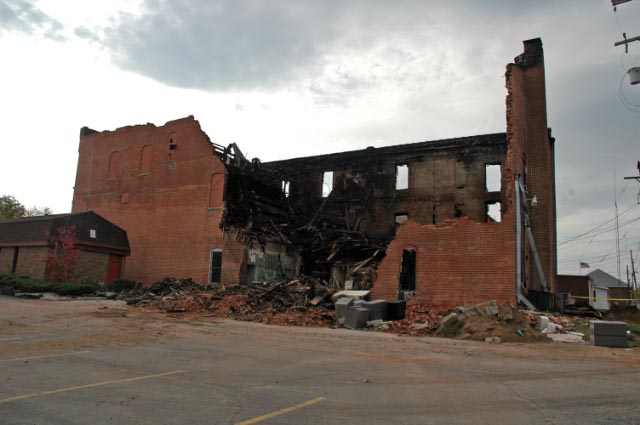 "We had a good train service then - five or six trains a day which made it easy for shows to come and go". Of course Colon also had an additional feature for stopovers in the hotel, the St. Joe House, which offered room and board for $5.00 per week. When this hotel burned, the Colon Township Library was built on the location. After World War II ended in 1945 the Opera House fell into disuse, except for an occasional high school graduation ceremony and a trickle of magic shows given by Harry Blackstone, Percy Abbott, and Monk Watson. Finally, in 1964, when the first-floor bank was remodeled the oak staircase leading to the second floor was removed and the Opera House was sealed off. The Colon Historical Society has saved a few items from the glory days of the Opera House, including the original gas chandelier.
"We had a good train service then - five or six trains a day which made it easy for shows to come and go". Of course Colon also had an additional feature for stopovers in the hotel, the St. Joe House, which offered room and board for $5.00 per week. When this hotel burned, the Colon Township Library was built on the location. After World War II ended in 1945 the Opera House fell into disuse, except for an occasional high school graduation ceremony and a trickle of magic shows given by Harry Blackstone, Percy Abbott, and Monk Watson. Finally, in 1964, when the first-floor bank was remodeled the oak staircase leading to the second floor was removed and the Opera House was sealed off. The Colon Historical Society has saved a few items from the glory days of the Opera House, including the original gas chandelier.
Unfortunately, in 1996, the building burned to the ground and Colon lost one of its most wonderful historical buildings.
This page was last modified <Saturday, 05-Aug-2017 20:03:41 MDT >
![]() This website is created and copyrighted 2010 by Joel Newport
This website is created and copyrighted 2010 by Joel Newport
Research, photos and content for this article were also written by and generously donated by Joe Ganger and the Colon Historical Society